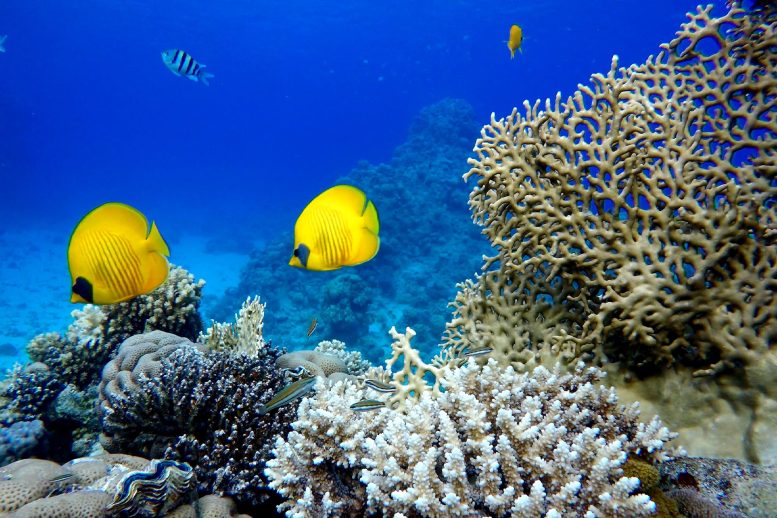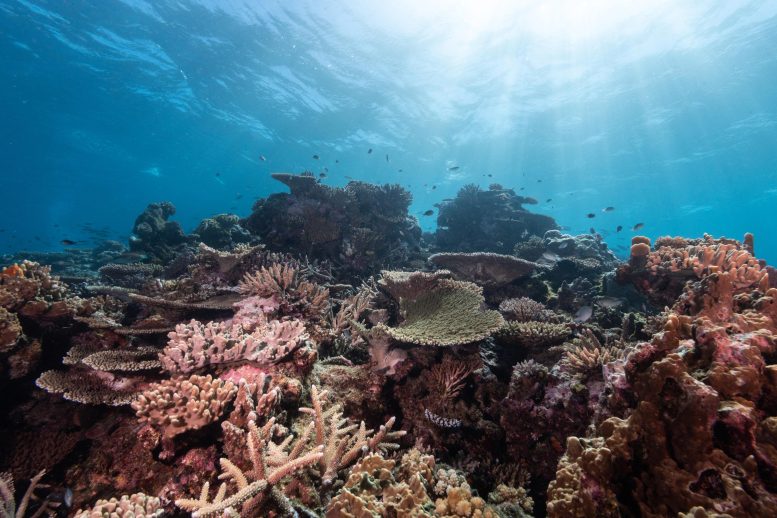
An international team of environmental scientists has published a series of significant recommendations to protect, conserve and study the world’s coral reefs – the ‘canaries in the coal mine’ of climate change.
The Vibrant Oceans Initiative presented their white paper on the future of the delicate and crucial habitats at the Our Oceans Conference held in Palau on Thursday.
Drawing on expertise from universities and wildlife conservation groups from across the world, including the University of Leicester, the group provide six key recommendations intended to promote the ‘persistence and survival’ of coral reefs.

Forecasts show that coral reef ecosystems around the globe – key to huge numbers of marine species and a source of food, livelihoods, and cultural heritage for half a billion people – are likely to become functionally degraded by 2050, if the goals of the Paris Agreement are not met.
Even with drastic emission reductions to ensure global warming is kept within 1.5°C (2.7°F) above pre-industrial levels, up to 90% of the world’s corals could still vanish in the next three decades, leaving behind a reef structure that will lose many of its functions.

Jens Zinke is a Professor of Palaeobiology at the University of Leicester, whose research examines large coral habitats to track environmental and climate change over the last three centuries into the modern day. Speaking about the report, of which he is a co-author, Professor Zinke said:
“Coral reefs are the ‘canaries in the coal mine’ when it comes to sensing ecosystems under stress from ocean warming due to climate change. Corals can sense when ocean temperatures exceed a dangerous threshold and warn us when we need to take measures.
“Our research has shown that coral reefs have been severely impacted by ocean warming in the past three to four decades, yet some reef locations show lower rates of warming or benefit from mitigating circumstances due to local oceanography.
“Some reefs have the ability to resist or recover from thermal stress faster than others, and these reefs may serve as sanctuaries under future warming. This is a major new research direction – to find those locations and protect them before they are gone.”
In 2018 the Vibrant Oceans group identified 50 reefs that are most likely to resist and survive climate change. The habitats are located largely in the Pacific and Indian oceans, with further reefs in the Caribbean and east of Africa.
Previously the 50 reefs were mainly chosen at sites that escaped climate change. Now, the scientists call for a wider portfolio of reefs that should include resistant and fast-recovering reefs.
The group’s latest recommendations, presented in the white paper ‘Forecasting Climate Sanctuaries for Securing the Future of Coral Reefs’, include:
- Continuation of the 50 Reefs approach as ‘climate change avoidance sanctuaries’ as a priority for investment in coral reef conservation.
- Expansion of the 50 Reefs conservation portfolio for climate change to include coral resistance and recovery sanctuaries.
- Increase in support for regional evaluations of the health of the 50 Reefs portfolio, and sustainable financing initiatives to support the implementation of regional portfolios.
- Catalyzing large-scale, data-driven coral reef monitoring efforts to test and develop new models and predictions of climate sanctuaries.
- Use of the latest climate coral reef science to guide investments, especially as the impacts of climate change accelerate and produce novel environmental stresses and responses among reefs.
- Embracing a far-reaching approach to the management of 50 Reefs sites, including connections to broader seascapes, fisheries and water quality management, mitigation of other pressures (for example, industrial development), so that effective and equitable management has measurable benefits for coral reefs and coastal communities.
‘Forecasting Climate Sanctuaries for Securing the Future of Coral Reefs’ is available in full from the Wildlife Conservation Society (WCS).
Funding partners for the initial Vibrant Oceans study include Bloomberg Philanthropies, while ongoing conservation work partners include Oceans 5, the Paul G. Allen Family Foundation, and Tiffany & Co. Foundation.
Conservation partners include the WCS, Rare, The Nature Conservancy, Blue Ventures, and Conservation Ecosystem Partnership Fund.